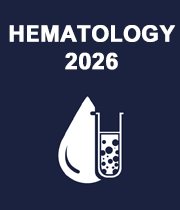Veterinary Hematology
The study of blood and blood problems is known as haematology. Hematologists and hematopathologists are specialists in the field of medicine. They specialise on blood and blood component disorders. Blood and bone marrow cells are examples of this. Anemia, infection, haemophilia, blood-clotting problems, and leukaemia can all be diagnosed with haematological tests. Hematology covers a wide range of issues, including hematopoiesis (the synthesis of all cell types in the blood) and hematopoietic cell testing in the lab. Because hematopoietic cells differ significantly between species, veterinary haematology is fascinating. To acquire correct findings, haematology analyzers must be calibrated for species variations. Blood cell morphology and blood parasites vary between animal species; hence technologists must be aware of this.



Title : Acute intermittent porphyria: A neurological dilemma obscured by ubiquitous fgastrointestinal presentation
Mayank Anand Singh, Mimer Medical College, India
Title : Comprehensive symptom management and supportive nursing care in a preterm toddler undergoing HSCT for pyruvate kinase deficiency
Tran Thi Dung, Vinmec International Hospital, Vietnam